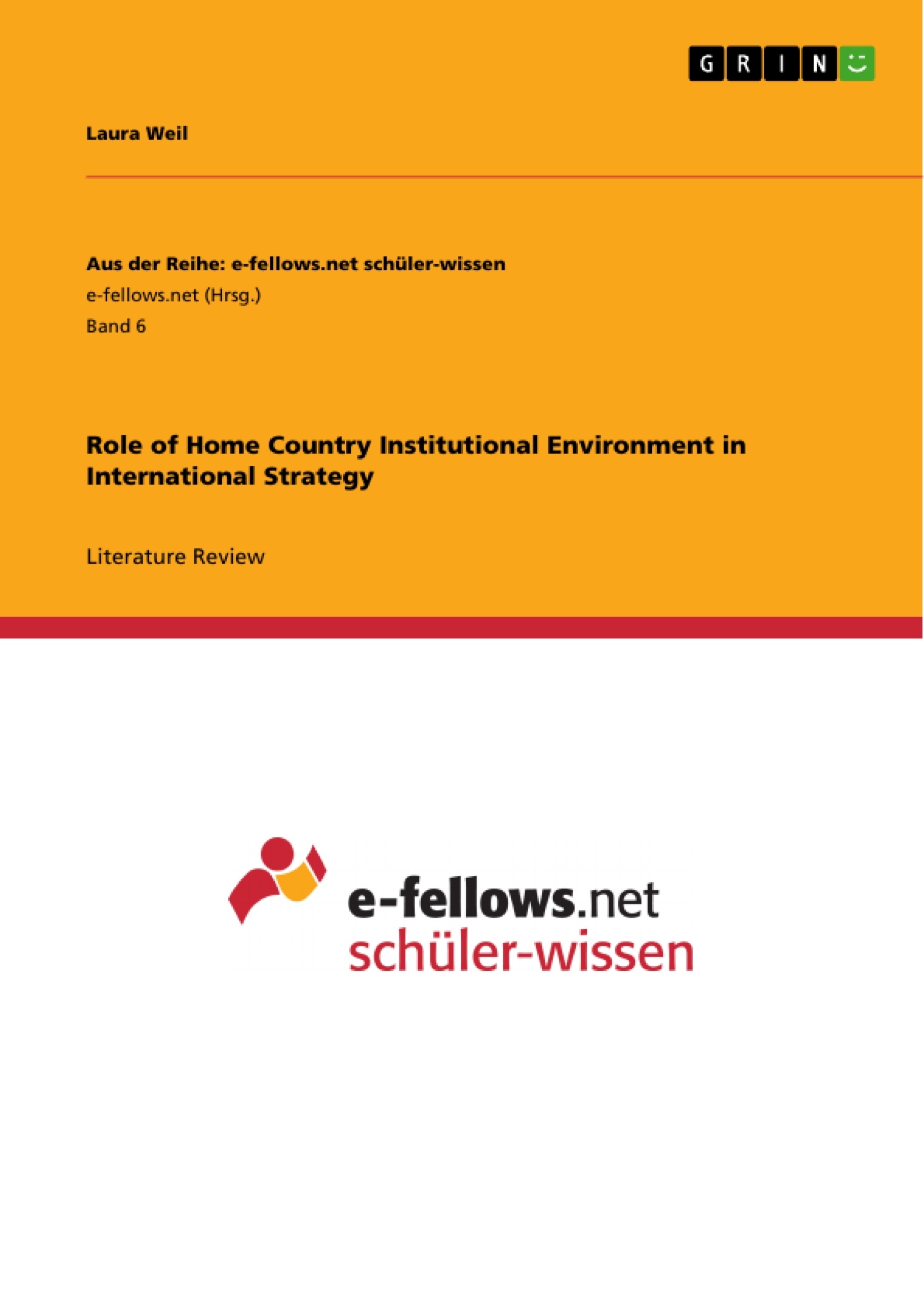The institutional environment in the home country of a firm is a basis for its organization and management and its strategy overall. It shapes the individual constitution and thus the organizational constitution in the regulative, normative and cognitive dimension.
To conclude, in order to become successful international it is necessary to understand the host countries institutional environment and the differences between the host and the home country. With this knowledge base a firm needs to evaluate if it needs to tangible and intangible resources. Afterwards, it needs to choose an entry mode with respect to the resource allocation it needs.
Inhaltsverzeichnis (Table of Contents)
- Introduction
- Definition of the Home Country Institutional Environment
- Influence of Institutions on Firm Strategies
- Differences of Institutional Environment between Developed and Emerging Economies
- Differences of Institutional Environment between Developed and Emerging Economies - Formal Institutions
- Institutional Change
- Collaboration
- Differences of Institutional Environment between Developed and Emerging Economies - Informal Institutions
- Differences of Institutional Environment between Developed and Emerging Economies - Formal Institutions
- Influence of Institutions on the Entry Mode Choice in International Strategy
- Conclusion
Zielsetzung und Themenschwerpunkte (Objectives and Key Themes)
This paper examines the role of home country institutional environment in shaping international business strategies. The main objective is to explore how these institutions influence firms' decisions, particularly their entry mode choices in international markets.
- The influence of home country institutions on firm strategies
- Differences in institutional environments between developed and emerging economies
- The impact of home country institutional environment on entry mode choice in international strategy
- The role of formal and informal institutions in shaping firm behavior
- The importance of cultural dimensions, such as uncertainty avoidance and power distance, in understanding institutional influences
Zusammenfassung der Kapitel (Chapter Summaries)
- Introduction: This chapter introduces the concept of home country institutional environment and its relevance in international strategy. It outlines the importance of understanding institutional factors for firms seeking to internationalize.
- Definition of the Home Country Institutional Environment: This chapter defines the concept of institutions and their influence on human interaction. It highlights the different aspects of institutions, including formal and informal institutions, and their impact on firm strategies.
- Influence of Institutions on Firm Strategies: This chapter explores the ways in which institutions influence firm strategies. It emphasizes the importance of considering institutional factors when formulating and implementing strategic decisions.
- Differences of Institutional Environment between Developed and Emerging Economies: This chapter examines the differences in institutional environments between developed and emerging economies, focusing on both formal and informal institutions. It explores how these differences affect firms' strategies and internationalization decisions.
- Influence of Institutions on the Entry Mode Choice in International Strategy: This chapter delves into the impact of home country institutional environment on entry mode choice in international strategy. It analyzes how different institutional frameworks influence firms' decisions regarding foreign market entry.
Schlüsselwörter (Keywords)
The paper explores key concepts such as home country institutional environment, international strategy, firm strategy, entry mode choice, formal institutions, informal institutions, developed economies, emerging economies, uncertainty avoidance, power distance, and cultural dimensions. It draws on research focusing on the impact of institutions on firm behavior and decision-making in a globalized context.
Frequently Asked Questions
How does the home country environment affect international strategy?
The institutional environment (regulative, normative, cognitive) forms the basis for a firm's organizational structure and overall strategic decisions.
What is the difference between formal and informal institutions?
Formal institutions include laws and regulations, while informal institutions consist of norms, values, and cultural dimensions like power distance.
How do institutional environments differ between developed and emerging economies?
They differ in terms of institutional stability, the level of collaboration, and the prevailing informal cultural norms that guide business behavior.
What role does "uncertainty avoidance" play in strategy?
It is a cultural dimension that influences how firms from certain home countries approach risk and choose their entry modes in foreign markets.
How does the institutional environment influence entry mode choice?
Firms evaluate the differences between their home and host countries to decide on resource allocation and the specific method of entering a new market.
- Citation du texte
- Laura Weil (Auteur), 2013, Role of Home Country Institutional Environment in International Strategy, Munich, GRIN Verlag, https://www.grin.com/document/263990



